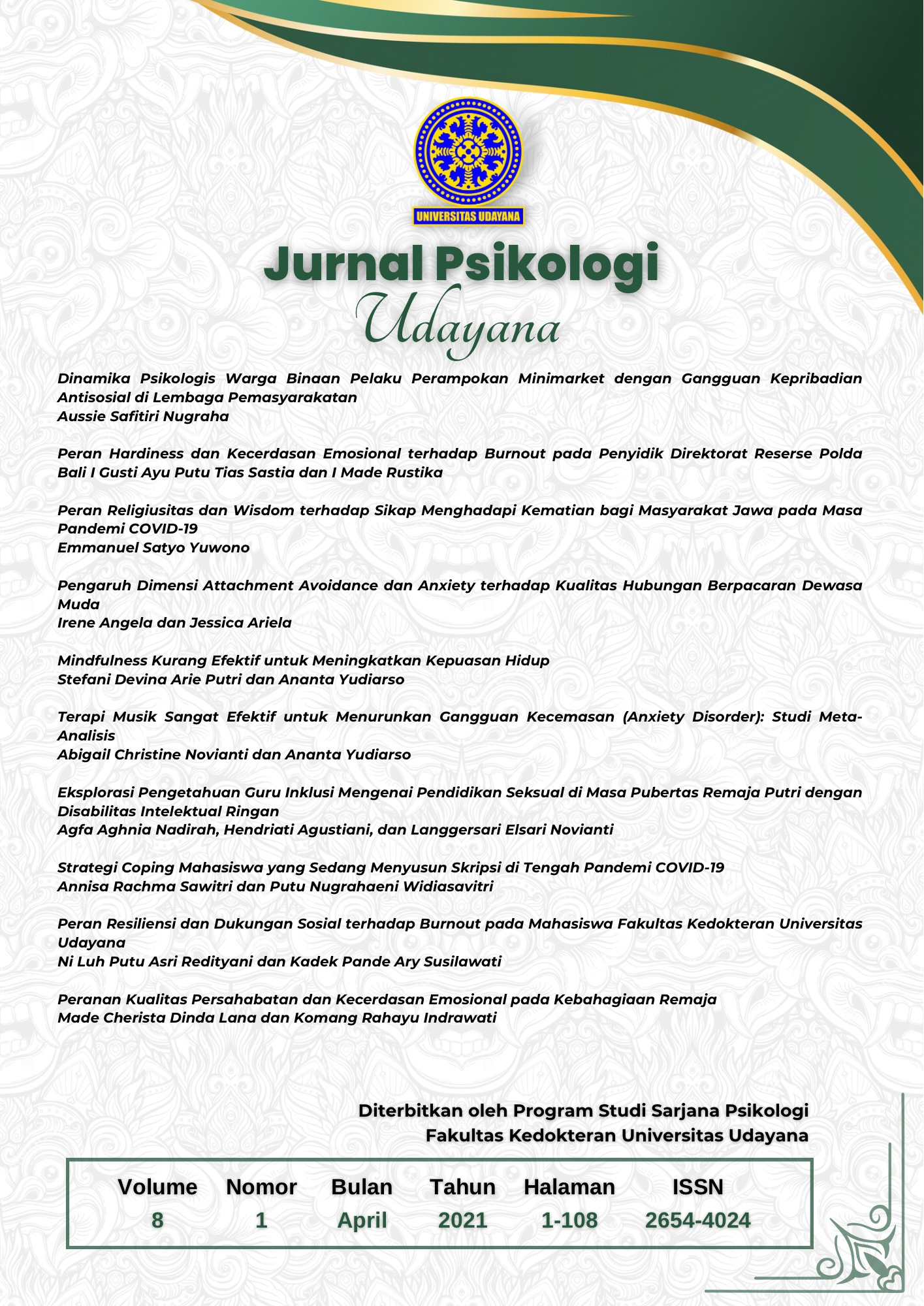Eksplorasi Pengetahuan Guru Inklusi Mengenai Pendidikan Seksual di Masa Pubertas Remaja Putri dengan Disabilitas Intelektual Ringan
Abstract
Sexual education at puberty is needed for young women with mild intellectual disabilities (ID) to help with puberty. Through sexual education, young women can have a better understanding of the changes that occur in their bodies and the right behavior to show in the social environment. This study aims to determine the knowledge of inclusive teachers about sexual education at puberty for young women with mild intellectual disabilities. This research was conducted using the principles of qualitative research. Data obtained based on interviews using telephone media to 4 inclusive school teachers in Bandung. Data were analyzed using thematic analysis techniques. The results show that knowledge about the characteristics of ID is still not mastered by all teachers. Knowledge about how to teach students with mild ID in the academic settings and the characteristics of puberty is owned by the four teachers based on their experience. However, all teachers do not yet have complete knowledge about the scope of sexual education material that needs to be provided as well as how to provide effective sexual education for young women with mild ID. Further research can be carried out to develop an intervention program design to improve the knowledge and skils of inclusive teachers to provide sexual education at puberty
Downloads
References
Anney, V. N. (2014). Ensuring the Quality of the Findings of Qualitative Research : Looking at Trustworthiness Criteria. Journal of Emerging Trends in Educational Research and Policy Studies (JETERAPS), 5(2), 272–281.
Aziz, S. (2014). Pendidikan Seks Bagi Anak Berkebutuhan Khusus. Jurnal Kependidikan, II(1), 87–108. https://doi.org/10.1080/14768320500230185
Braun, V., & Clarke, V. (2006). Using thematic analysis in psychology Virginia. Qualitative Research in Psychology, 3(2), 77–101. https://doi.org/10.1191/1478088706qp063oa
Guven, Serife Tutar & Isler, A. (2015). Sex Education and its Importance in Children with Intellectual Disabilities. Journal of Psychiatric Nursing, (January 2015). https://doi.org/10.5505/phd.2015.64936
International Planned Parenthood Federation (IPPF). (2010). IPPF Framework for Comprehensive Sexuality Education. London: International Planned Parenthood Federation, (January), 6. Retrieved from http://www.ippf.org/sites/default/files/ippf_framework_for_comprehensive_sexuality_education.pdf
Jahoda, A., & Pownall, J. (2014). Sexual understanding, sources of information and social networks; the reports of young people with intellectual disabilities and their non-disabled peers. Journal of Intellectual Disability Research, 58(5), 430–441. https://doi.org/10.1111/jir.12040
Johan, S. K., & Yassin, M. H. M. (2019). Knowledge and Practice of Sexual Education Teacher of Special Needs Students. Journal of ICSAR, 3(1), 1–7. https://doi.org/10.17977/um005v3i12019p001
Komnas Perempuan. (2020). Catatan Kekerasan Terhadap Perempuan Tahun 2019. Komnas Perempuan. Retrieved from https://www.komnasperempuan.go.id/file/pdf_file/2020/Catatan Tahunan Kekerasan Terhadap Perempuan 2020.pdf
Leavy, P. (2017). Research Design: Quantitative, Qualitative, Mixed Methods, Arts-Based, and Community-Based Participatory Research Approaches. New York: The Guilford Press. https://doi.org/10.1177/1558689817751775
Mash, Eric J; Wolve, D. A. (2016). Abnormal Child Psychology. Abnormal Child and Adolescent Psychology (6th ed.). USA: Cengage Learning. https://doi.org/10.4324/9781315660271-2
Menteri Pendidikan Nasional Republik Indonesia. Peraturan Menteri Pendidikan Nasional Republik Indonesia No 70 Tahun 2009, Pub. L. No. 1 (2009). Jakarta. Retrieved from https://jdih.kemdikbud.go.id/arsip/Permendikbud_Tahun2009_Nomor070.pdf
Murphy, N. A., & Elias, E. R. (2006). Sexuality of children and adolescents with developmental disabilities. Pediatrics, 118(1), 398–403. https://doi.org/10.1542/peds.2006-1115
Nelson, B., Odberg Pettersson, K., & Emmelin, M. (2020). Experiences of teaching sexual and reproductive health to students with intellectual disabilities. Sex Education, 20(4), 398–412. https://doi.org/10.1080/14681811.2019.1707652
Ramage, K. (2015). Sexual Health Education for Adolescents with Intellectual Disabilities: A Literature Review. The Saskatchewan Prevention Institute, (September).
Rowe, B., & Wright, C. (2017). Sexual knowledge in adolescents with intellectual disabilities: A timely reflection. Journal of Social Inclusion, 8(2), 42. https://doi.org/10.36251/josi.123
Salkind, N. J. (2012). Exploring Research. Retrieved from http://dinus.ac.id/repository/docs/ajar/Neil_J._Salkind_2012_-_Exploring_Research_.pdf
Schaafsma, D., Kok, G., Stoffelen, J. M. T., & Curfs, L. M. G. (2017). People with Intellectual Disabilities Talk About Sexuality: Implications for the Development of Sex Education. Sexuality and Disability, 35(1), 21–38. https://doi.org/10.1007/s11195-016-9466-4
Schaafsma, Dilana. (2013). Sexuality and Intellectual Disability. Implications for sex education. https://doi.org/10.1097/DBP.0000000000000218
UNESCO. (2018). International technical guidance on sexuality education. United Nations Educational Scientific and Cultural Organization SDGs. https://doi.org/10.1523/JNEUROSCI.0529-04.2004
Virginia Braun; Victoria Clarke. (2013). Successful Qualitative Research: A Practical Guide for Beginners. London: SAGE Publication.
Zacharin, M. R. (2009). Puberty, contraception, and hormonal management for young people with disabilities. Clinical Pediatrics, 48(2), 149–155. https://doi.org/10.1177/0009922808324492

This work is licensed under a Creative Commons Attribution-ShareAlike 4.0 International License.
Authors who publish with this journal agree to the following terms:
- Authors retain copyright and grant the journal right of first publication with the work simultaneously licensed under a Creative Commons Attribution-ShareAlike 4.0 International License that allows others to share the work with an acknowledgement of the works authorship and initial publication in this journal.
- Authors are able to enter into separate, additional contractual arrangements for the non-exclusive distribution of the journals published version of the work (e.g., post it to an institutional repository or publish it in a book), with an acknowledgement of its initial publication in this journal.
- Authors are permitted and encouraged to post their work online (e.g., in institutional repositories or on their website) prior to and during the submission process, as it can lead to productive exchanges, as well as earlier and greater citation of published work (See The Effect of Open Access).













